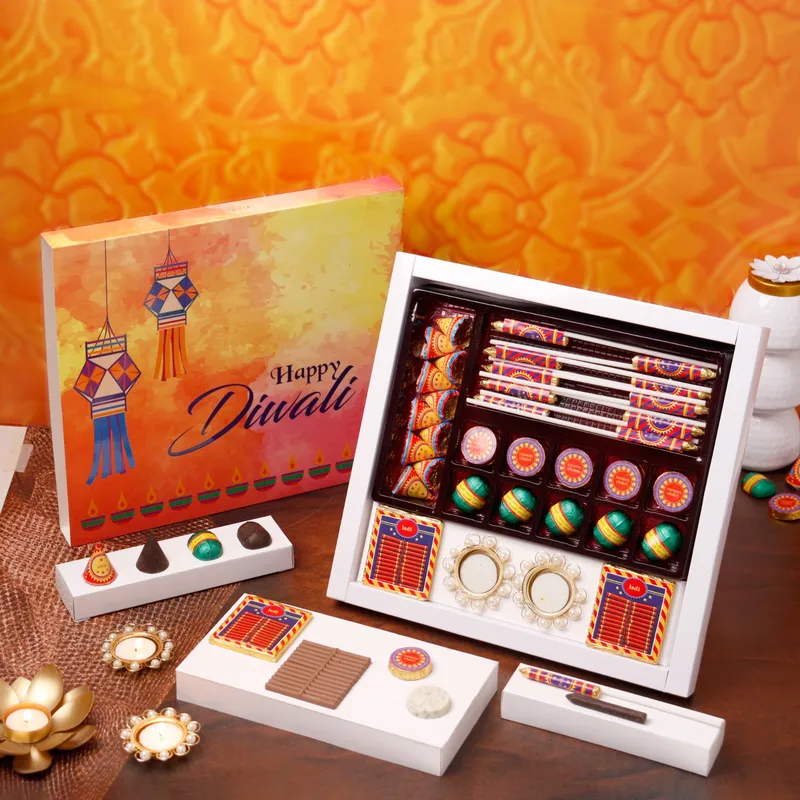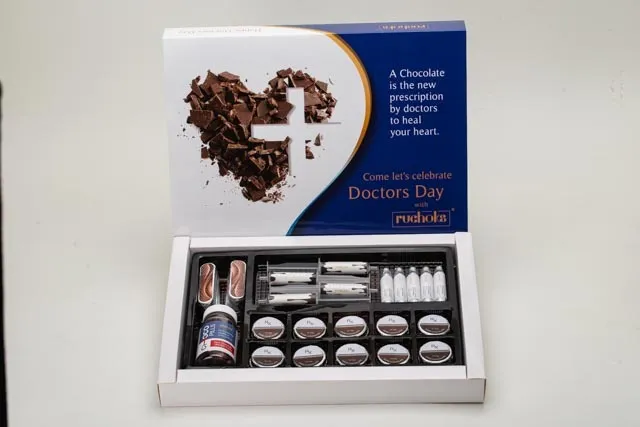How Brownwall is competing with giants like Cadbury and Nestle in the corporate gifting space
In the next two to three years, Brownwall aspires to reach the Rs 500 crore milestone by expanding into international markets, especially the US, UK, and countries with a significant Indian population.
In 2009, Ruchika Bhangdiya, an architect turned entrepreneur, started a small chocolate-making business—a venture that laid the foundation of Brownwall Food Products Pvt Ltd. The company today challenges industry giants such as Cadbury and Nestle, with its unique chocolates in the corporate gifting space.
has carved a niche for itself in this competitive market with its chocolate brand Ruchoks.
A significant turning point for Brownwall came in 2017 when it introduced its patented chocolates (chocolates shaped like crackers) for its B2B clients during Diwali. “It took a year of research and development but this product proved to be a game-changer for us. We were able to secure deals with companies across India,” says founder Ruchika Bhangdiya.

It not only solidified Brownwall's position in the gifting industry but also instilled a clear vision within the company, to maintain creativity at the heart of its products. The customer base has grown from 2500 in 2019 to more than 10,000 in 2023.
Previously earning an average revenue of Rs 5 crore, the bootstrapped company has recently experienced significant growth. In FY22, the company’s revenue reached Rs 30 crore, and in FY23, it surged to Rs 45 crore, marking a YoY growth of 50%. The projected revenue for FY24 is Rs 90 crore.
Within the next two to three years, Brownwall aspires to reach the Rs 500 crore milestone by expanding into international markets. Additionally, in 2020, it introduced its healthy snacking brand, Dibha, which the founder believes will play a significant role in boosting exports due to the global demand for such products.
From home kitchen to a 40,000 square-ft facility
Bhangdiya says her love for cooking nudged her to start a business.
“When I moved from Solapur to Mumbai, adapting to the lifestyle here was challenging. While I had a background in architecture, my true passion had always been cooking. So I chose to start a small business from home,” Bhangdiya adds.
The founder started her entrepreneurial career with a chocolate-making business from her kitchen. She spent the early years (from 2011 to 2014) setting up a small counter in a mall, the rent for which was Rs 5,000. This gave her opportunities to gather instant customer feedback and establish crucial connections. By 2012, she had a team of 10.
“I met many corporate employees who were looking for gifting partners. Many offices invited me to showcase my products and we cracked a few deals,” says Bhangdiya.
In 2015, Ruchika's husband Dinesh Bhangdiya, a Chartered Accountant made a significant career change. Recognising the promising opportunities in the corporate gifting sector, he left his practice to become part of the venture. This was another turning point for the business as he started handling finance, says Bhangdiya.
The cracker chocolate in 2017 turned out to be a game-changer.
What began as a modest home-based venture has now grown into a 40,000-square-foot manufacturing facility with a production capacity of 2 tons of chocolates and 2 to 3 tonnes of snacks per day.
The COVID-19 pandemic prompted Brownwall to diversify its offerings. It introduced a new brand called 'Dibha' which offered immunity boosters, dehydrated fruits, healthy seeds, and snacks like makhana and ragi chips. This strategic move allowed it to tap into the growing demand for healthier snack options.

Dibha's products
With the United Nations declaring 2023 as the international year of millets, the brand is capitalising on this trend by introducing millet-based products like puffs, premixes, chocolates, and more.
Innovation is the key
According to a report by the IMARC Group, the chocolate market size in India reached $2.4 billion in 2022. It is expected to reach $4.1 billion by 2028, exhibiting a Compound Annual Growth Rate (CAGR) of 8.8% from 2023 to 2028.
Customisation is the hallmark of Brownwall, says the founder.
“We craft chocolates in various shapes, ranging from cars and medical instruments to pencils and tablet strips. Depending on our clients' preferences, we can create any shape imaginable,” says the founder.

Every year, Brownwall introduces fresh and innovative products during the festive season. It also offers personalised gifting for special occasions like birthdays, weddings, and baby showers.
Today, Brownwall serves as a gifting partner to approximately 150 companies, including Axis Bank, ICICI Bank, HSBC, Asian Paints, and Audi.
Despite competition from big brands like Cadbury, Nestle, and premium choices like Ferrero Rocher, Brownwall says it is carving a niche for itself in the corporate gifting space.
Talking about the manufacturing process, Bhangdiya says that she oversees recipe development and design, drawing from her passion for cooking. The production process is 70% automated. There are around 200 people working in its factory with 80% of the workforce comprising women.
Different floors are dedicated to the production of chocolates and snacks, with separate packaging areas. Since the company specialises in gifting, special attention is given to the packaging.
For chocolates, raw materials are sourced both from India and abroad (Africa and Singapore), with a significant contribution from India. These materials include cocoa powder, emulsifiers, milk solids, and so on. The manufacturing process involves quality control checks, precise mixing and tempering, and finally pouring the mix into moulds at a designated temperature.
Snacks, on the other hand, rely on raw materials procured directly from farms from across India. These materials undergo cleaning, segregation, roasting, flavoring, and packaging. No artificial flavoring agents, emulsifiers, or preservatives are used in the products, says the founder.
While the primary focus, especially for Ruchoks, is on business-to-business (B2B) customers, Ruchoks and Dibha also cater D2C customers through their websites. It has a presence on ecommerce platforms like Amazon and Flipkart.
Future plans
Looking ahead, Brownwall's major focus lies in further automation for faster service for its clients. One of the major focus for the company in the coming years is exports. It aims to expand its presence in the international market, with a focus on exporting its healthy snacks.
“While we already export chocolates to select countries during Diwali through different channels, we plan to ramp up our direct export operations, with the goal of reaching Rs 500 crore in revenue within two years,” says Bhangdiya. It will start exporting to countries with a significant Indian population.
“We also plan to be present in all major retail outlets across India in the next three years,” says the founder.
(The copy was updated to correct a factual error)
Edited by Affirunisa Kankudti







